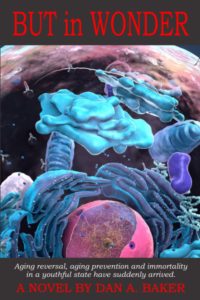Forever and Ever, the first book in Dan A. Baker’s Endless Life trilogy, introduced readers to Dr. Jasmine Metcalf, a plucky and pioneering scientist who developed a gene-based therapy capable of reversing the aging process. As word of her discovery spread, Jasmine found herself embroiled in political, moral, philosophical, and legal conflicts as she and society, in general, grappled with the conundrum of whether the pursuit of immortality is necessary or wise simply because it is possible.
Now, in But in Wonder, Jasmine’s adventure continues apace as Baker once again seamlessly merges science fiction with science fact to craft a story that is currently beyond the realm of possibility… but only just. By combining meticulous research into cutting-edge branches of science, such as gene therapy, artificial stem cells, and synthetic genes, with explosive action and deadly intrigue, Baker continues the thought-provoking and entertaining trilogy in a highly engaging fashion.
It has been three years since Will Behlen, the molecular biologist who collaborated with Jasmine on her gene therapy research and also entered into an out-of-character love affair with her, went into hiding following the hijacking and corruption of their work, leaving Jasmine to face the consequences of their apparent failure alone. However, Will has continued his work in secret during that period, and believing that the time is finally right to bring Jasmine into the project, he invites her to join him in “Nice Life Planet.”
Once there, Jasmine learns that Will and his group have made rapid advancements in their aging reversal technology by using artificial intelligence and supercomputer networks to identify new genes and protein folds. What’s more, the use of cloned generic pluripotent stem cells, which Jasmine had believed to still be in the development stage, has allowed them to overcome the immunity issues that were holding them back, leading to the construction of a completely artificial organ that can be implanted in the body to trigger the de-aging process. More importantly, the group has already begun human testing, including on Will.
But in Wonder follows Jasmine as she struggles to get to grips with the implications of the new technology, both for individuals and for humanity as a whole. Despite the scientific brilliance she displayed in Forever and Ever, she very much takes a backseat in relation to the science of de-aging in this sequel, as the breakthroughs have already been made prior to her arrival. She is arguably the character who devotes the most thought to the likely consequences of immortality, but it would have been good if she hadn’t been relegated to a supporting role.
It is Will who takes center stage in But in Wonder, as he is the one who holds all the cards and has oversight of the entire age reversal project. He is portrayed as something of an eccentric genius, which does mean that he is sometimes pompous and irritating, particularly when spouting riddles during the early stages of his reunion with Jasmine. Fortunately, as he settles into his de-aged persona, he undergoes some significant growth and development. The relationship between Will and Jasmine isn’t always convincing, especially the polyamorous aspects, but they are largely realistic and likable characters.
The area in which Baker really excels in But in Wonder concerns the speculative fiction aspects of the story, the merging of the real with the very nearly real. Much of what occurs throughout the story is frighteningly plausible, even if it’s not technologically feasible at the present moment. As such, But in Wonder provides a timely warning of some of the potential dangers of unchecked technological advancement while simultaneously offering an exciting and action-packed story.


